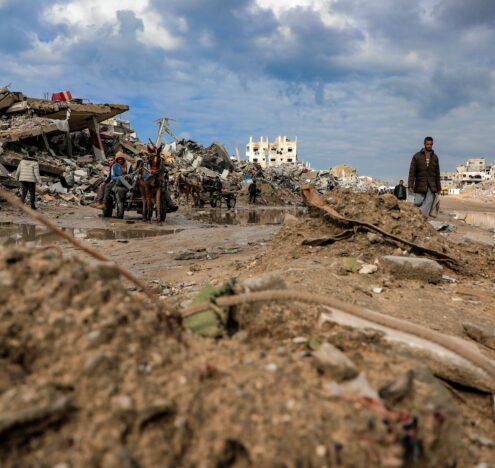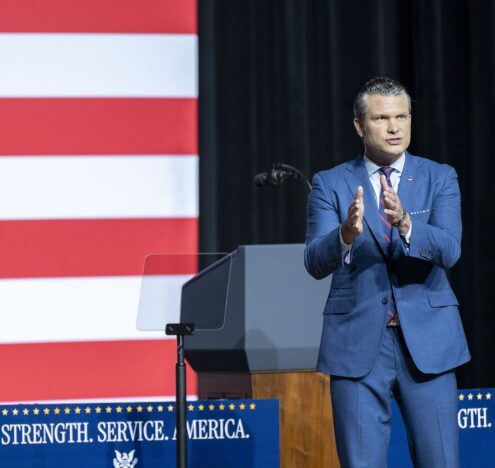“Adults in a Room” is a series in collaboration with The Atlantic Council’s New American Engagement Initiative (NAEI). The series stems from NAEI’s monthly networking events that call on analysts to gather virtually and hash out a salient topic. This series aims to give you a peek into their Zoom room and a deep understanding of the issue at hand in less than the time it takes to sip your morning coffee, without the jargon, acronyms, and stuffiness that often come with expertise.
In the United States, there is a dominant narrative that Russia deserves punishment for its offensive war in Ukraine and a belief that, undoubtedly, the rest of the world must see it that way. Yet, most of the world’s countries have not signed on to the sanctions regime against Russia, and there is waning support in the UN for US-led condemnations of Russian actions. So why is the Global South, in particular, distancing itself from the Western position on Ukraine? What does the divide over Ukraine tell us about the current distribution of power in the international system?
The US needs to appreciate where interests might differ and set reasonable expectations for dealing with countries when complete alignment is impossible.
The Atlantic Council’s New American Engagement Initiative’s (NAEI) April roundtable brought several experts to discuss the views of the war in Ukraine from outside of the United States and Europe. The discussion focused heavily on the differing interests that many countries in the Global South have compared with the West and the established ties many of them have with Russia. In addition, participants debated how Western actions against Russia, particularly the sanctions regime, may have caused a backlash among the Global South and a fear that such tools may be used against them, leading to increased interest in alternative global financial systems. Four experts shared their takeaways from the discussion below.
Aude Darnal, Associate Director, New American Engagement Initiative
The war in Ukraine has led some to lump the world into two camps: autocracies versus democracies. But the response of non-Western states to the conflict has proven that leaders around the world are not solely making decisions based on ideology. For instance, African leaders’ reactions varied across the continent, and several democracies did not take a stand against Russia in the UN General Assembly votes of March 2 and April 7. Moreover, President Joe Biden has repeatedly praised Western unity. But the administration’s failed attempts to pressure countries from Africa and Asia, even as it calls to integrate them within the global order to secure their support, demonstrate a continuing shortsighted strategy and a misunderstanding of the Global South.
Over the past several years, non-Western countries have sought to diversify their partnerships to advance their interests. Within the context of a global order that has historically benefited the West and which has regularly bent norms in its favor — from overt military intervention to support for autocratic leaders ― the Global South is now taking the opportunity of the war in Ukraine to call out the West’s double standards and affirm their agency. The United States and its Western allies should drop their paternalistic and exceptionalist approach. The new multipolar world, in which non-Western states will legitimately have greater power, commands a restructuring of the global order and its institutions. This calls, therefore, not for greater pressure from the West but rather for the creation of mutually beneficial partnerships and the United States and its Western allies to respect international norms and pursue policies that will make them attractive partners for the rest of the world.
Irfan Nooruddin, Senior Director, Atlantic Council’s South Asia Center
The United States’ leadership in mounting a coordinated trans-Atlantic economic response to President Vladimir Putin’s war on Ukraine is noteworthy and significant. Yet, its desire to marshall a global condemnation of the war is destined to fall short of its universalist ambitions. Three-quarters of the world’s population live in countries that did not vote in favor of the various UN resolutions condemning Russia’s invasion of Ukraine. What does this fact tell us about US power, democracy, and the state of the international liberal order?
On the one hand, invoking freedom and democracy lacks the mobilizing power its advocates desire, but this has more to do with the sorry state of democracy globally than with the present conflict. A global democratic recession has been underway for a decade. Unsurprisingly, autocrats and would-be dictators are reluctant to condemn Putin too publicly for fear of someday being in the sights of the liberal order themselves. For example, far more troubling for the West is its inability to get India to cooperate, especially given the elevated status that country now enjoys as a vital partner of the United States in its anti-China strategic framework. If you can’t get your “friends” to help out in a crisis, you shouldn’t be surprised when your enemies aren’t lining up to do so either.
Eric Gomez, Director of Defense Policy Studies, Cato Institute
The muted reaction of many countries that are not in Europe to Russia’s invasion of Ukraine is an important reminder of how the interests of most states do not align with US interests. This has important implications for how the United States thinks about international engagement, especially given the “great power competition” frame many policy debates in Washington take.
The United States needs to appreciate where interests might differ and set reasonable expectations for dealing with countries when complete alignment is impossible. Pushing states into an agreement rather than meeting them where they are is unlikely to win friends. Vague US warnings of counter actions in response to the Solomon Islands coming to a security agreement with China is a good example of how not to react.
Furthermore, the United States needs to resolve its foreign policy messaging tensions. For example, suppose the United States wishes to position itself as a champion of democracy. In that case, it should get tougher toward all autocracies, including countries like Saudi Arabia, Egypt, and the United Arab Emirates, without exception. If the United States is playing shrewd power politics against significant threats, it should stop framing its foreign policy in ideological and moral terms.
Ideally, the United States would move toward a restrained foreign policy that has a generally decreased perception of foreign threats and lead on human rights and democracy issues through example.
Sarang Shidore, Director of Studies, Quincy Institute
Why is the United States so fascinated with the idea of a grand battle between democracies and autocracies?
Ideas such as “freedom” and “leadership of the free world” have been tropes in US foreign policy thinking for a very long time. Yet, a vigorous effort to remake the world in its image took off only during the unipolar decades of the 1990s and Noughties. So naturally, the United States, having achieved a material triumph, also sought a normative one. But the twin disasters of the “war on terror” and Wall Street buried the unipolar moment.
In the wake of the illegal Russian invasion of Ukraine, Washington is exultant over a return of unity of the “West.” But the US alliance system outside Europe is fraying. Allies and partners increasingly exhibit a la carte behavior. The Global South is unmoved, and its attitude has mainly been lukewarm or nonaligned. Asia’s rise seems relentless. All this in a time of deep polarization and multiple failures on the domestic front.
The new normative zeal may be more due to gnawing anxiety over American weakness than a sense of American strength. When material capacity and influence diminish, a new turn to normativism is tempting. It is a means to reclaim legitimacy at home and abroad and fill us with a renewed sense of purpose and meaning.




















